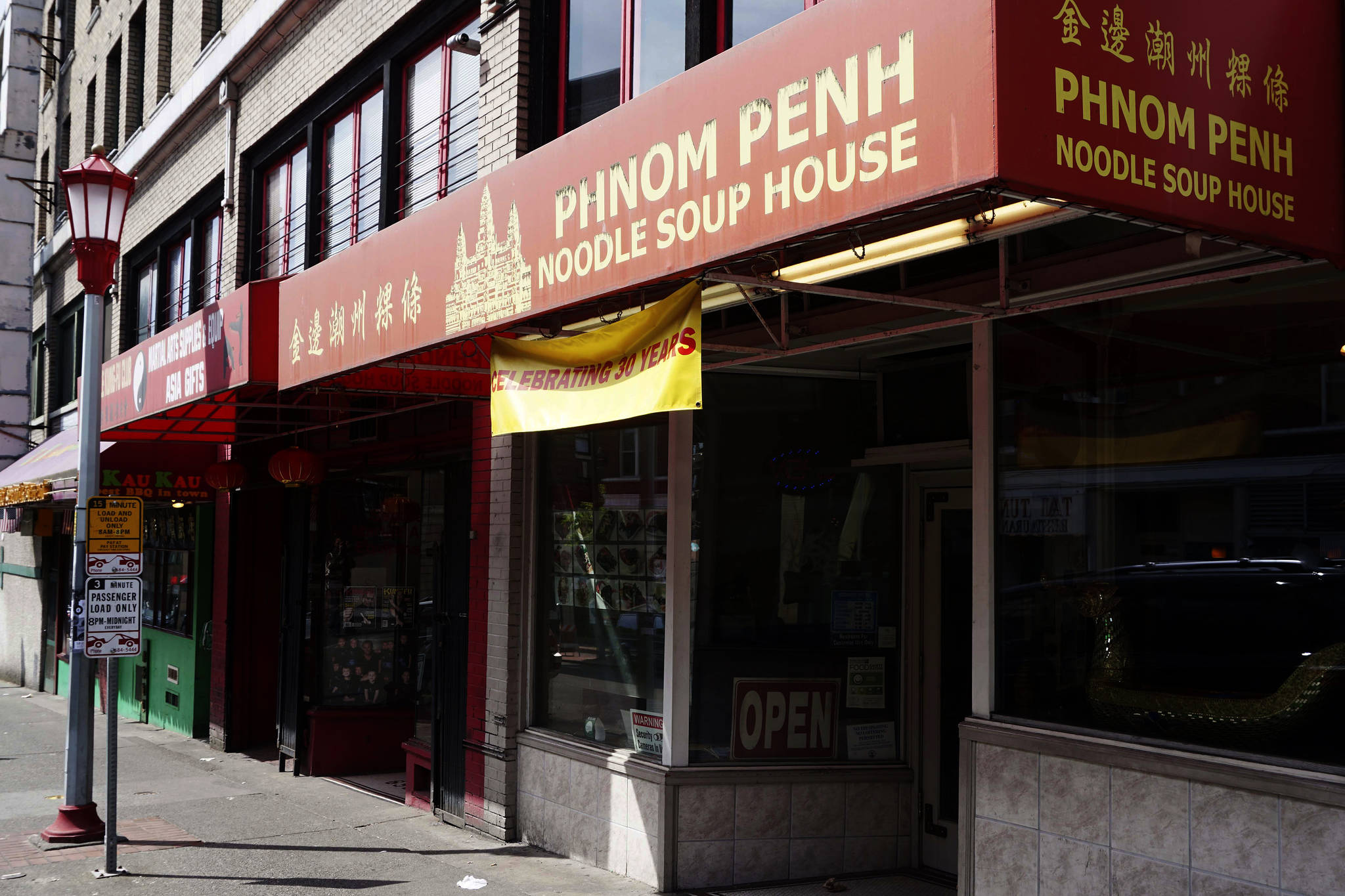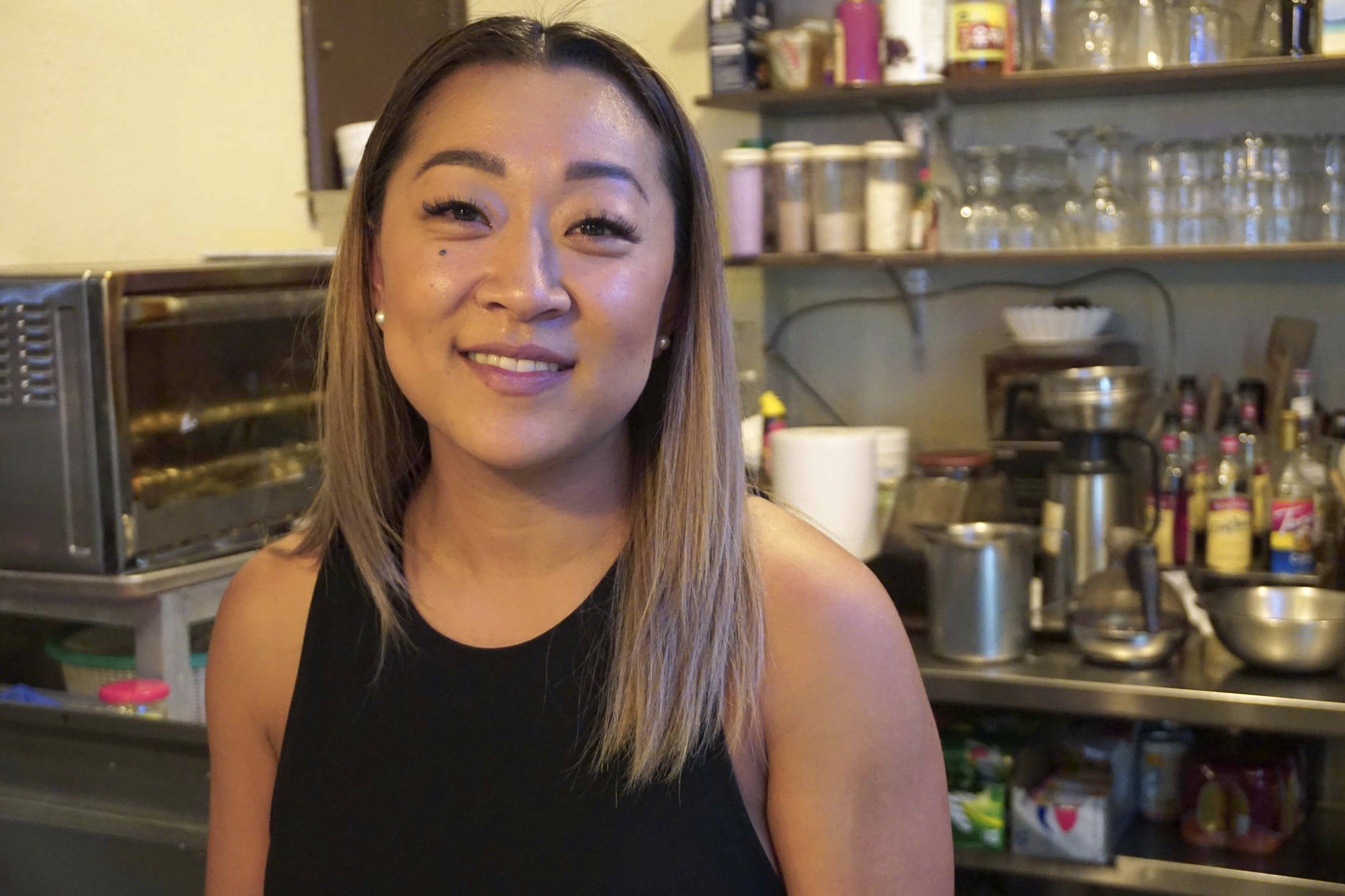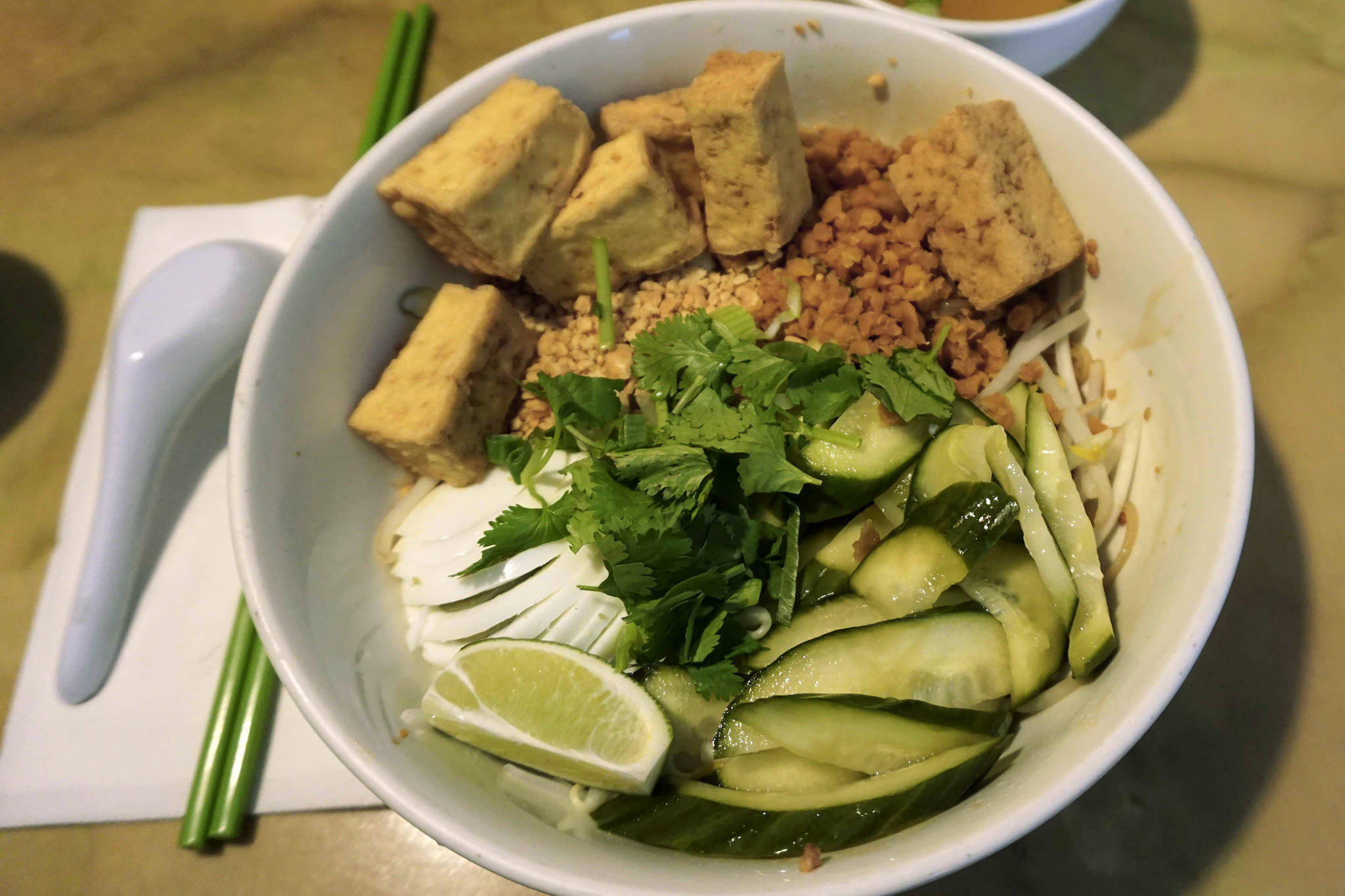It’s not uncommon for tourists freshly arrived from SeaTac Airport to wheel their luggage into Chinatown-International District’s Phnom Penh Noodle House and immediately tell the servers that they’ll have their usual. A sense of comfort and familiarity defines the city’s only Cambodian restaurant, where you don’t have to be local to be a regular. The customers who travel here from far-flung places like New York or Tennessee come for the authentic cuisine, but stay for the community.
After last Thursday’s lunch rush, only a few customers remained in the normally slammed restaurant on South King Street. While most affordable restaurants sacrifice style for ease, Phnom Penh’s dining room ambiance pays tribute to Cambodian culture with paintings of ancient temples and Khmer classical dancers frozen in undulating movement hung in gold-plated frames that adorn the walls. The pop music that softly plays overhead accompanies the staccato clanking of chopsticks against porcelain bowls and the eager sound of someone slurping broth as if they were savoring their grandmother’s prized cooking.
The only disturbance to this restaurant rhapsody came when an elderly customer sauntered up to the counter to pay his bill. In a raspy voice with a hint of disbelief, he asked co-owner Darlene Le, “Are you really closing?”
After 30 years in business, Phnom Penh is shutting its doors on May 28. When Le confirmed the man’s fear, he hung his head and delivered the common refrain that Darlene and her co-owner sister Dawn Ung have heard since the April announcement that the restaurant would shut down, “Sad.”
Long considered a hub for the local Cambodian community, news of Phnom Penh’s impending closure has customers visiting from near and far to say their final goodbyes. Sam Ung, the sisters’ father, founded the restaurant in 1987. When he retired in 2007 and the sisters assumed ownership, the restaurant already had a dedicated following that spanned cultures and generations.
Darlene and Dawn had all intentions of continuing their family’s legacy until tragedy struck last fall. In September, Dawn’s son, Devin, was hit by a car and suffered traumatic brain injuries. The accident rendered him unable to eat, speak, or move on his own. The resulting financial and emotional toll caused the family to make the difficult decision to close the eatery, although Dawn said she would like to reopen the establishment one day.
Commenters have flocked to the Phnom Penh’s Facebook page to express their sympathy to the family and mourn a loss for the local community. Out-of-state customers have even pledged to fly out for one last bite. Over the past few weeks, long lines have stretched out the door, sometimes forcing the restaurant to close by the afternoon because the food has sold out.
Phnom Penh grew in popularity, in part, because it filled a hole in the community—one that many say will be difficult to replace. Washington state has the third highest Cambodian American population in the country—trailing only California and Massachusetts—with around 10,400 people of Cambodian origin living in King County, according to 2016 census data. But the over 2,000 Cambodians living in Seattle will soon be left without a community hub that offers authentic Cambodian cuisine, with Queen’s Deli in White Center becoming the closest Cambodian eatery option. Some regulars with families voiced concern that Phnom Penh’s absence will make it more difficult to expose their kids to their Cambodian heritage. Moreover, they say that the loss of the gathering space highlights the lack of diversity within Seattle’s culinary community.
For Phnom Penh Noodle House founder Sam Ung, food always held the power to heal, inspire creativity and foster camaraderie. He originally found his passion for cooking as a youth in Cambodia at his parent’s restaurant. Access to food later became a matter of survival when the Khmer Rouge took control of the country in the mid-1970s (as detailed in Ung’s 2011 autobiography, I Survived the Killing Fields: The True Life Story of a Cambodian Refugee).
Ung and his wife Kim eventually immigrated to Seattle as refugees in 1980, where he quickly picked up cooking jobs throughout the city. Opening up the restaurant in 1987 was a dream come true for the Ungs. They worked long hours, and Sam always sought to uplift his neighbors in the Chinatown-International District by volunteering and donating food to those in need. “It’s true that when you serve the community they serve you back,” said Diane Le, Ung’s other daughter.
Hong Chhuor, communications manager at Asian Counseling and Referral Service, noted that Ung’s contributions to the organization were integral to the community. “Sam Ung and his family have been long-time supporters of Asian Counseling and Referral Service, and have donated their time, culinary talents, and treasure to support ACRS through the years as part of our capital campaigns, our Walk for Rice and A Culinary Journey, our annual fundraising dinner,” Chhuor wrote in an email to Seattle Weekly.
The family’s charity to neighborhood organizations dovetailed with their cultivation of a loyal customer base. Dawn fondly remembers entertaining regulars at the restaurant’s original location on Maynard Avenue, which is now the home of the Northwest Asian Weekly Newspaper. But she also recalls having to work weekends while she was growing up, and witnessing the toll that running Phnom Penh while also working another job at The Rainier Club took on her father’s home life.
Dawn and Darlene intentionally strayed from their parent’s footsteps by enrolling in pre-nursing schools and working at Harborview Medical Center. “They wanted us to do anything besides restaurant business, because it is very, very grueling,” Dawn said during a recent interview at the Phnom Penh. “Coming to the U.S., trying to give your children a better life, it just wasn’t in their plans for us to take over.”
Yet when their parents discussed retiring in the mid-2000s, Darlene and Dawn decided to quit school and take over the restaurant to carry on their family’s legacy. In Dawn’s eyes, the thought of living without the noodle house was tantamount to losing home. “Our customers who’ve been dining with us since the beginning, where would they go?”
In the years since the sisters took over, Phnom Penh Noodle House remained a hub for the local community and served as a destination for a visiting Cambodian politician and authors. “There’s always a good chance that when you step into the restaurant during the busy hours that you’re going to see somebody else that you know,” said Diane.
One woman who worked for Delta Airlines would even fly to Seattle from Boise, Idaho every other month just to eat lunch at the restaurant, returning home the same day. More often than not, the out-of-town guests were former Seattle residents who moved away. “When they come, it’s kind of their routine. They stop here first,” said Dawn. “They have to get their fix.”
People often come for Battambang’s Favorite Noodle, a filling dish replete with slithers of pickled cucumber, boiled eggs, chopped nuts, and fried tofu over a bed of rice noodles. A small heap of chopped cilantro lends it a refreshing undertone, while a dash of lime offers a touch of acidity that cuts through the savory dish. The meal’s texture and flavor is as nuanced as the restaurant’s rich history.
A regular since his middle school days, Sameth Mell, 35, noted the restaurant’s closure ties into complex issues including the displacement of immigrant communities throughout the city. As the outreach and resident services manager at Mount Baker Housing Association and co-organizer at the Coalition of Immigrants Refugees & Communities of Color, Mell is familiar with the economic pressures that make it difficult for small businesses owned by minorities to survive in Seattle. “Right now as we’re … having more than 43 of our community members being deported back to Cambodia,” Mell said. “We’re being gentrified … as a community of color out of Seattle, and now our cultural-ethnic businesses are going out as well. It’s a huge wave of ‘let’s erase these people and their culture out of here.’ ”
He implored policy-makers to consider how to create space for minority communities to survive and flourish in the city. “Tech businesses that are coming into Seattle and the city need to find ways to support these mom and pops and small business,” he suggested. In the face of its closure, Mell has clocked in even more visits to the restaurant.
Real estate agent Tom Ouk, 38, has patronized the eatery for two decades, and echoed Mell’s concerns. Ouk was born in Cambodia and grew up in a refugee camp in Thailand, so the establishment connects him to his roots. The food also offers Ouk a rare chance to share the true flavors of his homeland with his children during their family’s visits, which happen at least twice a week. “It’s very difficult to find the true authentic Cambodian foods here in Washington or America. We’ve tried many other Cambodian restaurants … but it doesn’t taste the same even though the dish name the same.”
As a member of the nonprofit Cambodian Community Health Board, Ouk has co-hosted outreach events at Phnom Penh every other month to inform attendees about diabetes, hypertension, the dangers of smoking and alcohol. They also discuss additional resources that are needed in the community, such as translation services for people who are applying for citizenship and how to facilitate access to transportation. “It represents us all as a community,” Ouk said about Phnom Penh Noodle House. “To see the restaurant closing, it’s devastating. We’ve always been going there, and now it’s like … what now?”
A Szechuan restaurant will take over Phnom Penh Noodle House’s space for the remainder of the lease, and Dawn said she didn’t know of anyone within the local Cambodian community who is interested in creating an eatery to take its place.
Although the local restaurant scene’s diversity problem has stumped many observers, Philip Deng, founder and CEO of MarketShare—a local nonprofit that seeks to empower under-resourced entrepreneurs in the food industry—largely attributes it to Seattle’s rising cost of living and the cultural appropriation of marginalized communities’ cuisines. “I think what is most important to note is that diversity is increasing on restaurant menus—as mainstream customers seek more globally representative flavors—while diversity in restaurant proprietorship has failed to keep pace with the broadening variety of dishes being served,” Deng wrote in an email to Seattle Weekly. “Ask any Seattle restaurateur how much capital and risk is involved with opening a restaurant close to or in the downtown core, and I think you’ll have most of your answer as to why less economically powerful groups such as newly arrived immigrants and refugees are less able to open their own food businesses in similar areas.” Deng is currently raising funds for MarketShare’s proposed plan to transform the King Street Station into an incubator for immigrant and refugee chefs, which he hopes could help address the lack of Cambodian and other type of cuisines in the area.
Meanwhile, the local Cambodian community has stepped up for the Phnom Penh family by offering emotional and financial support to Dawn and her son, Devin. A GoFundMe page dedicated to his recovery has raised nearly $80,000 since launching last September. Devin now lives in a skilled nursing facility, and Dawn cares for him in between her work shifts at the extra job she picked up at Princi bakery in Starbucks Reserve Roastery. Offers of legal, therapy, and health care services have helped keep the family going during this difficult time.
“I had a sense of it, but didn’t realize how much love, really, there was for us,” said Dawn. “It’s amazing how food could have that impact on others.”










